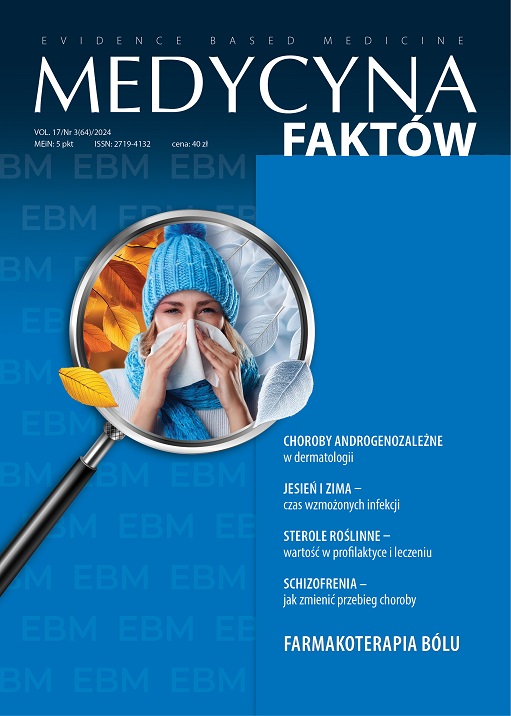The role of omeprazole as a protective drug in therapy Review article
Main Article Content
Abstract
The paper presents typical symptoms of gastroesophageal reflux, the principles of diagnosing the disease and the causes of its possible exacerbations. The significant impact of senior age, some diseases and groups of drugs that most often exacerbate gastroesophageal reflux disease symptoms is emphasized. It was indicated that the basic therapy is the addition of a proton pump inhibitor, e.g. omeprazole. Lack of therapy reduces the quality of life of patients and leads to the risk of complications such as esophageal stricture or glandular carcinoma of the esophagus.
Article Details
How to Cite
Sapilak, B. J. (2024). The role of omeprazole as a protective drug in therapy. Medycyna Faktow (J EBM), 17(3(64), 398-401. https://doi.org/10.24292/01.MF.0324.13
Issue
Section
Articles
Copyright ? by Medical Education. All rights reserved.
References
1. Reguła J. Epidemiologia choroby refluksowej w Polsce. Materiały IX Warszawskich Spotkań Gastroenterologicznych. Warszawa 2003.
2. Richter JE, Rubenstein JH. Presentation and epidemiology of gastroesophageal reflux disease. Gastroenterology 2018;154: 267-76.
3. Smoliński P. Optymalizowanie leczenia uporczywych objawów choroby refluksowej z uwzględnieniem tzw. terapii dodanej w praktyce lekarskiej. Lekarz POZ. 2021; 7(4).
4. Ruszniewski P, Soufflet C, Barthélémy P. Nonsteroidal anti-inflammatory drug use as a risk factor for gastro-oesophageal reflux disease: an observational study. Aliment Pharmacol Ther. 2008; 28(9): 1134-9.
5. K?pçak S, Ça?ano?lu D, Ergün et al. In Vitro and In Vivo Effects of Nonsteroidal Anti-inflammatory Drugs and Aspirin on Rabbit Esophageal Epithelium. Turk J Gastroenterol. 2022; 33(3): 257-270.
6. Ishikawa H, Iwakiri K, Sugiura T et al. Effect of nifedipine administration (10 mg) on esophageal acid exposure time. J Gastroenterol. 2000; 35: 43-6.
7. Hamada A, Ishii J, Doi K et al. Increased risk of exacerbating gastrointestinal disease among elderly patients following treatment with calcium channel blockers. J Clin Pharm Ther. 2008; 33: 619-24
8. Yoshida K, Furuta K, Adachi K et al. Effects of anti-hypertensive drugs on esophageal body contraction. World J Gastroenterol. 2010; 16: 987-91.
9. Mungan Z, P?narbaş? Şimşek B. Which drugs are risk factors for the development of gastroesophageal reflux disease? Turk J Gastroenterol. 2017; 28(Suppl 1): S38-S43.
10. Fangxu L, Wenbin L, Pan Z et al. Chinese Geriatrics Society. Chinese expert consensus on diagnosis and management of gastroesophageal reflux disease in the elderly (2023). Aging Med (Milton). 2024; 7(2): 143-157.
11. Cerspsimo MG, Raina GB, Pecci C et al. Gastrointestinal manifestations in Parkinson?s disease: prevalence and occurrence before motor symptoms. J Neurol. 2013; 260(5): 1332-38.
12. Wang X, Pitchumoni CS, Chandrarana K et al. Increased prevalence of symptoms of gastroesophageal reflux diseases in type 2 diabetics with neuropathy. World J Gastroenterol. 2008; 14(5): 709-12.
2. Richter JE, Rubenstein JH. Presentation and epidemiology of gastroesophageal reflux disease. Gastroenterology 2018;154: 267-76.
3. Smoliński P. Optymalizowanie leczenia uporczywych objawów choroby refluksowej z uwzględnieniem tzw. terapii dodanej w praktyce lekarskiej. Lekarz POZ. 2021; 7(4).
4. Ruszniewski P, Soufflet C, Barthélémy P. Nonsteroidal anti-inflammatory drug use as a risk factor for gastro-oesophageal reflux disease: an observational study. Aliment Pharmacol Ther. 2008; 28(9): 1134-9.
5. K?pçak S, Ça?ano?lu D, Ergün et al. In Vitro and In Vivo Effects of Nonsteroidal Anti-inflammatory Drugs and Aspirin on Rabbit Esophageal Epithelium. Turk J Gastroenterol. 2022; 33(3): 257-270.
6. Ishikawa H, Iwakiri K, Sugiura T et al. Effect of nifedipine administration (10 mg) on esophageal acid exposure time. J Gastroenterol. 2000; 35: 43-6.
7. Hamada A, Ishii J, Doi K et al. Increased risk of exacerbating gastrointestinal disease among elderly patients following treatment with calcium channel blockers. J Clin Pharm Ther. 2008; 33: 619-24
8. Yoshida K, Furuta K, Adachi K et al. Effects of anti-hypertensive drugs on esophageal body contraction. World J Gastroenterol. 2010; 16: 987-91.
9. Mungan Z, P?narbaş? Şimşek B. Which drugs are risk factors for the development of gastroesophageal reflux disease? Turk J Gastroenterol. 2017; 28(Suppl 1): S38-S43.
10. Fangxu L, Wenbin L, Pan Z et al. Chinese Geriatrics Society. Chinese expert consensus on diagnosis and management of gastroesophageal reflux disease in the elderly (2023). Aging Med (Milton). 2024; 7(2): 143-157.
11. Cerspsimo MG, Raina GB, Pecci C et al. Gastrointestinal manifestations in Parkinson?s disease: prevalence and occurrence before motor symptoms. J Neurol. 2013; 260(5): 1332-38.
12. Wang X, Pitchumoni CS, Chandrarana K et al. Increased prevalence of symptoms of gastroesophageal reflux diseases in type 2 diabetics with neuropathy. World J Gastroenterol. 2008; 14(5): 709-12.

